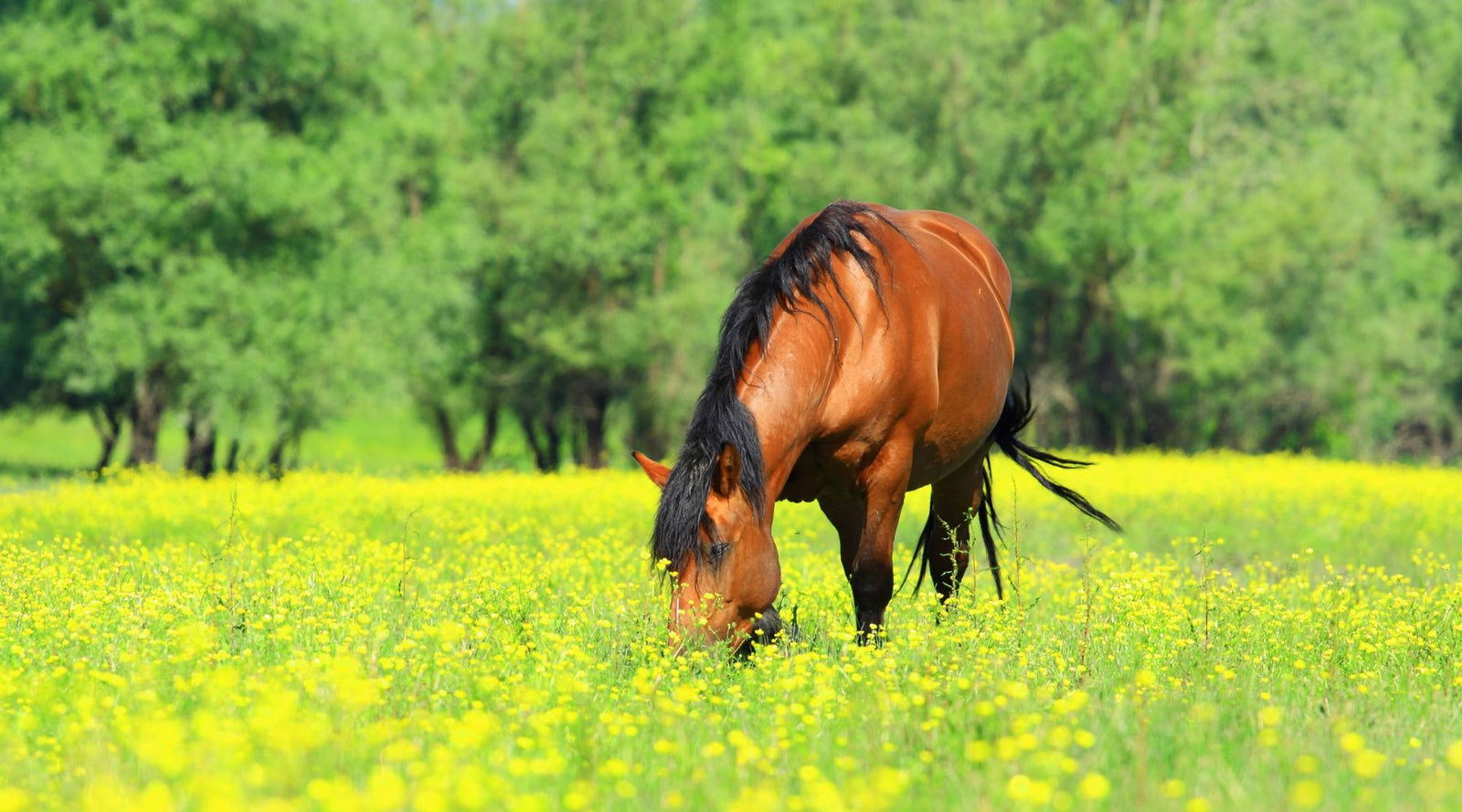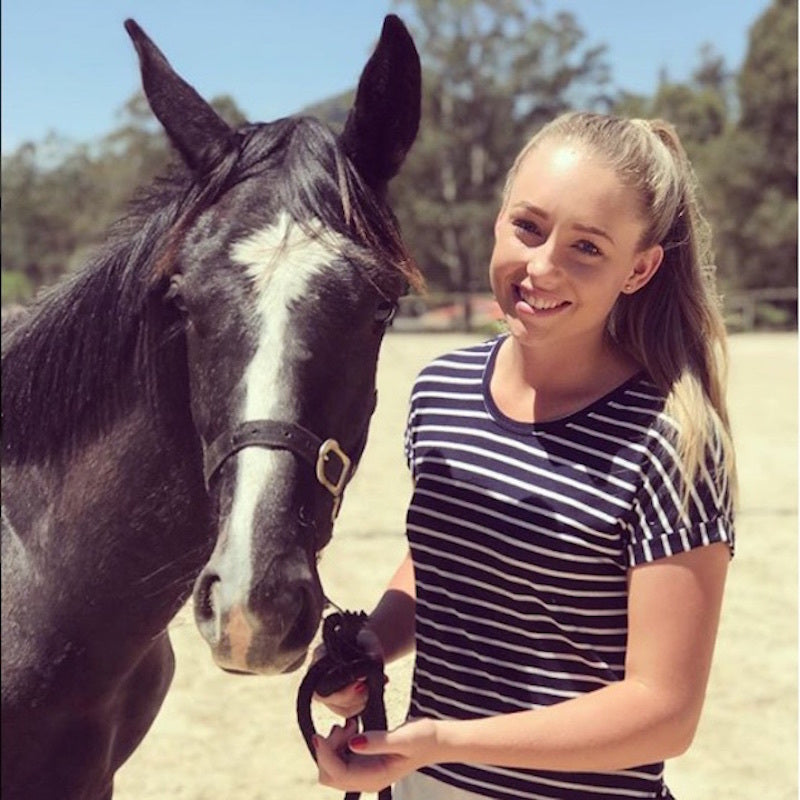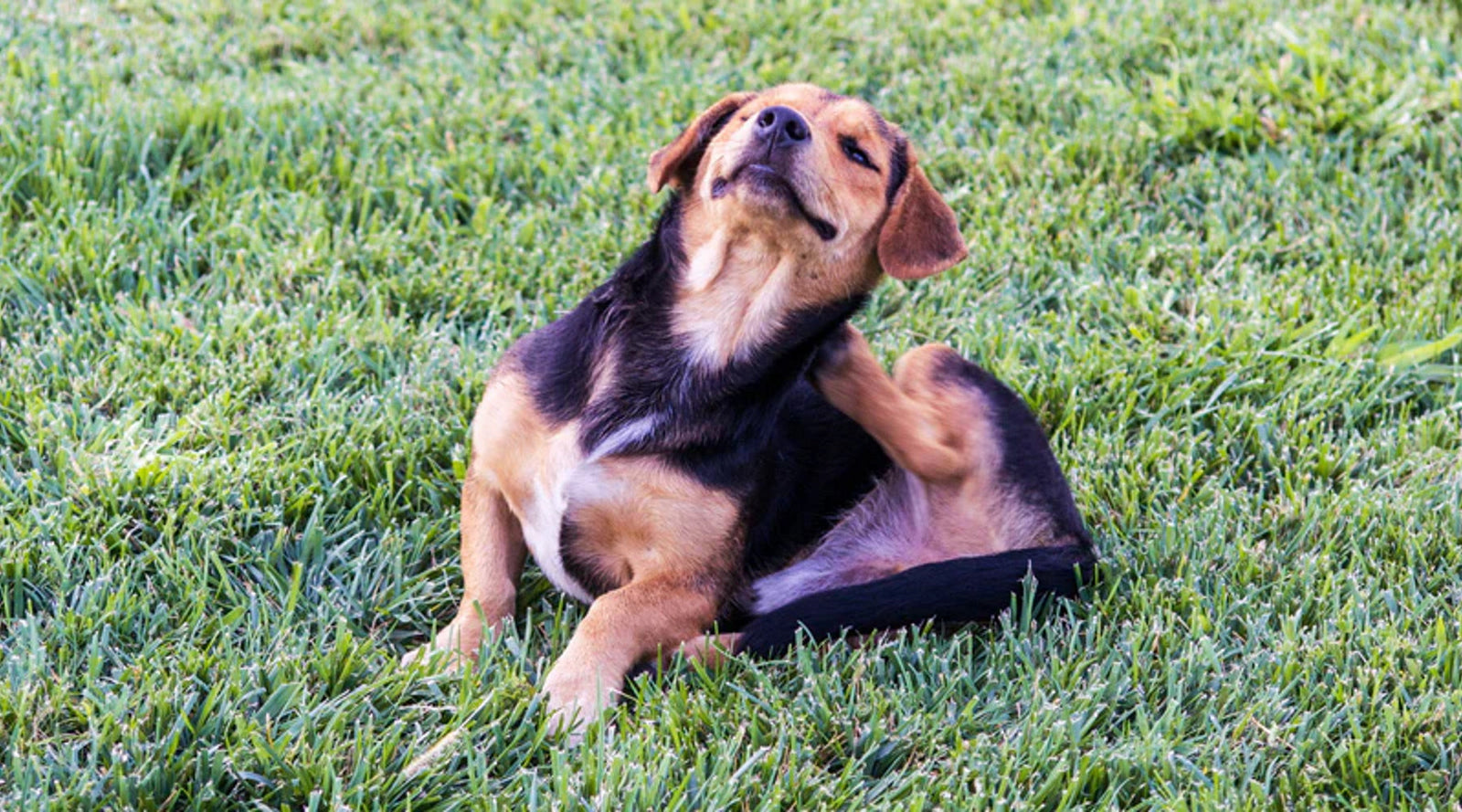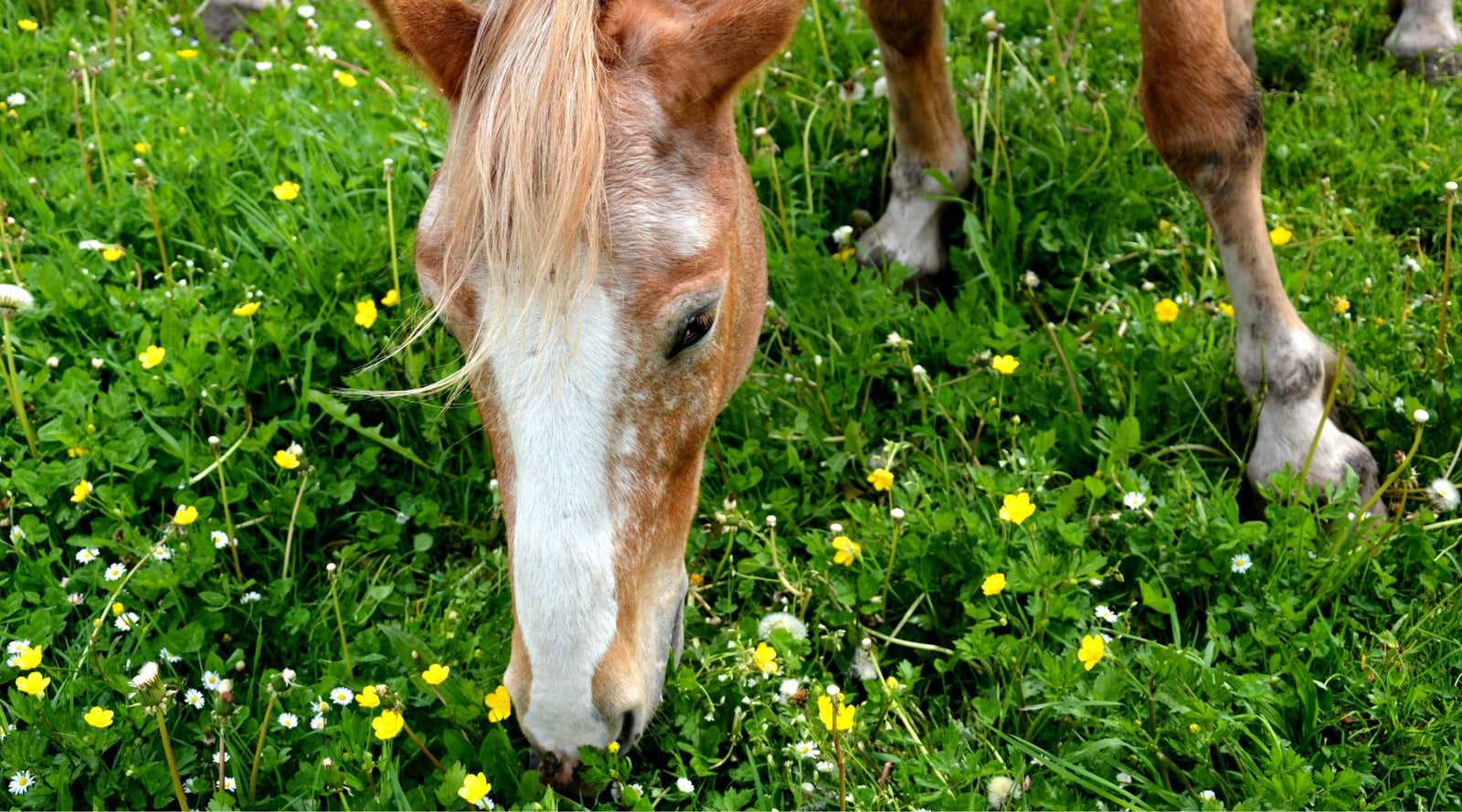Triple Hippo Rewards points are now available on all purchases made before midnight 24th February 2026.
Triple Hippo Rewards points are now available on all purchases made before midnight 24th February 2026.
Horse & Rider
Spring grass growth and your horse - 7 conditions to watch for
by Fiona Lane August 27, 2025

When spring arrives, so does lush new grass – and with it, a range of seasonal challenges for horse owners. From ryegrass staggers and grass crazies to laminitis, pollen allergies and ticks, these conditions can affect your horse’s health, behaviour and comfort. Understanding the causes, symptoms, and management options, including natural support remedies, will help you keep your horse healthy through the changing seasons.
Key Highlights
- Spring grass growth can trigger conditions such as ryegrass staggers, grass crazies, laminitis, pollen allergies and grass mumps.
- Endophyte toxins in ryegrass can cause uncoordinated movement, trembling or spookiness known as ryegrass staggers.
- Horses grazing on high-potassium, low-magnesium pastures may become anxious or unpredictable, often referred to as grass crazies.
- If unmanaged, spring grass-related issues can lead to laminitis, photosensitivity, scouring in foals, or secondary infections like Mud Fever.
- Management strategies include rotating paddocks, restricting access to lush grass, monitoring for early symptoms, and reducing exposure to pollen and ticks.
- Hippo Health offers a range of natural remedies to support horses through spring, including Ryegrass Staggers, Grass Crazies, Laminitis, Photosensitivity, Pollen and Ticks remedies.
Spring grass brings welcome growth but also potential risks for horses. In this blog, we explore the most common conditions caused by spring pasture, their symptoms, and natural ways to support your horse’s wellbeing through the season.
Causes, symptoms and management of ryegrass staggers
Fungi present in perennial ryegrass can produce endophyte toxins that affect the brain and spinal cord control of horses grazing in affected paddocks. Ryegrass staggers is most common in hot and humid climates, or when ryegrass goes to seed, which can be any time from November onwards in the Southern hemisphere.
Ryegrass staggers symptoms
As the central nervous system is affected, a horse with ryegrass staggers may appear uncoordinated, may tremble, stagger, or even fall, or may be hypersensitive to noises and spook easily. Severity of symptoms can vary from horse to horse, and not all horses who graze on an affected paddock will present with symptoms.
Managing a horse with ryegrass staggers
Move the affected horse off grass or to a paddock without ryegrass for 7-10 days. When using feed, be aware that new-season hay may include ryegrass. For horses prone to staggers, start them on our Ryegrass Staggers Prev remedy to help with building a normal immune response to the toxins. If staggers have already taken hold, try our Ryegrass Staggers Acute remedy. Both of these remedies can also be used on livestock.
Grass crazies causes, symptoms and management
Grazing on pasture that has excessive potassium levels combined with low magnesium and calcium. Grasses – especially clover and ryegrass – need potassium to grow, which is why levels can be higher in Spring.
How to spot grass crazies
A horse that is grass affected – often called grass crazies – will appear spooky and nervous with behaviour that is unpredictable or aggressive to the point where riding them is not recommended.
Managing grass crazies
Closely manage access to grass, or keep them off grass altogether. If you are able, rotate paddocks giving new grass time to mature, although be aware that new clover growth can occur underneath more mature grass. You can also start adding our Grass Crazies - Equine remedy to feed, or pump directly into the mouth twice daily. The remedy is 100% natural and safe to use alongside veterinary care.
Causes, symptoms and management of grass mumps
It’s widely believed that Grass Mumps (parotiditis) is an allergic reaction caused by exposure to sugar-rich grass or pollens.
Symptoms of grass mumps
Affected horses present with swelling in the parotid salivary glands that sit behind the jawbone. Glands will often swell while the horse is at pasture, with swelling reducing once off pasture for 36 hours or more. The swelling is soft and not painful, and there aren’t usually any other symptoms or behavioural changes. If the horse shows signs of being unwell and off their food, has a fever, nasal discharge or abscesses near the lymph nodes, consult your veterinarian.
Managing a horse with grass mumps
Keep your horse off grazing for a couple of days, and lift their feed off the floor to help the gland to drain. You could also use our Grass Mumps remedy to help with managing symptoms.
Laminitis causes, symptoms and management
Soluble carbohydrates commonly found in spring grass and clover cause metabolic changes to the blood that flows to the laminae, causing weakening, which can result in permanent damage. Overweight horses, mares in foal and those with hormonal imbalances (ie. Equine Metabolic Syndrome or Cushings disease) or those prone to gorging are also at higher risk of laminitis. Once a horse has had a laminitis attack, they will be prone to more in the future.
Symptoms of laminitis
Laminitis usually affects the front feet, causing the horse to rock back onto their heels as they try to relieve discomfort by shifting their weight. The front feet will often feel excessively hot and have a strong pulse, which can be felt at the back of the fetlock.
Managing a horse with laminitis
Restricting access to new grass and lush green pastures can help to prevent a laminitis attack, as can dosing with our LamiPrev remedy. Once laminitis takes hold, box rest and close dietary management are essential, along with managing any pain or discomfort. Our LamATK remedy can also help by supporting a normal immune response to the symptoms of laminitis. Read more about laminitis causes, symptoms, prevention, and management.
Causes, symptoms and management of photosensitivity
Fluorescing chemicals, such as chlorophyll in lush green grass or that blue-green algae in water troughs, pass into the bloodstream when digested and circulate around the body. In areas like a horse’s stockings or muzzle where there is little pigment or hair, the sun’s ultraviolet rays can easily pass through the skin causing the compounds to fluoresce, and this results in a type of ‘sunburn’ that occurs from the inside out.
Symptoms of photosensitivity
The main symptoms are broken skin, ulceration and fluid build-up. Bacteria can enter broken skin, setting up a secondary infection such as Mud Fever. If your horse has recurring Mud Fever during a time when there is lots of lush green grass around, treating for photosensitivity might be required. Read more about the difference between Mud Fever and Photosensitivity.
Managing a horse with photosensitivity
Restricting access to the lush grass or water trough algae and keeping the affected horse out of direct sunlight are key to managing Photosensitivity, as well as ensuring you treat any bacterial infections that have taken hold in the broken skin. Our Photosensitivity Support remedy can assist with the prevention and management of symptoms. We also sell a Photosensitivity Kit, which includes our Photosensitivity Support remedy, Liver Plus to help rid the bloodstream of fluorescing compounds and Puffiness Plus for minor swelling or oedema.
Horses with Pollen Allergies
Just like humans, horses can be affected by Spring pollen releases. In New Zealand, pine pollen can be a particular problem. The immune system can become hypersensitised to specific allergens, resulting in an overproduction of antibodies when those allergens are present.
Symptoms of pollen allergy in horses
Coughing, wheezing, head shaking and lethargy or lack of concentration that can affect performance.
Managing a pollen allergy
Try to avoid riding on days when the pollen count is particularly high. Wetting your horse's hay or feed can help by preventing further irritation from dust. Adding our Pine & Pollen remedy to the water trough is an easy and cost-effective way to help manage one or more horses with itching or hayfever-like symptoms such as coughing. If your horse has symptoms that include welts, then Grass Allergy – Equine is the remedy for them.
Keeping your horse free of ticks
Longer grass in spring and summer makes it easier for ticks to find their way onto horses and livestock.
Symptoms of tick bites
Tick bites can cause your horse to become irritable. In other cases you may notice some swelling, inflammation or infection around the bite.
Keeping your horse free of ticks
Keep bushes and grass trimmed, or introduce natural predators such as chickens. You can also dose with our Ticks Plus – Equine remedy. Adding this remedy to the water trough every second day is an easy and economical way to dose your whole herd! Read more about our natural Ticks Plus remedy.
Start thinking about sun management
While not directly caused by new grass growth, Spring is a time when our horses start spending more time outdoors, and the sun becomes more intense. Our Sol Plus – Equine is a natural remedy that can help with managing the effects of sun damage for pink-skinned horses or those prone to sunburn. We recommend dosing starts in Spring to allow time for this remedy to build up. Read more about this groundbreaking natural sun management remedy for horses.
Final thoughts
Spring grass can be both a blessing and a challenge for horse owners, with conditions like ryegrass staggers, laminitis, grass crazies and pollen allergies all more common at this time of year. By recognising the signs early, managing grazing, and supporting your horse’s health with natural remedies, you can help them stay comfortable through the season. Explore our full range of Spring remedies for more ways to support your horse.
General Disclaimer: Always follow dosing instructions. Our remedies are formulated to support the natural immune system of horses, pets, livestock, and people. We do not claim to treat, medicate, or cure any health conditions. If you are worried an animal may be in pain or suffering, please contact your veterinarian.




